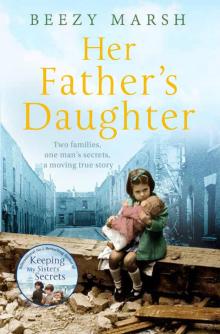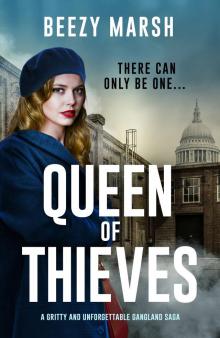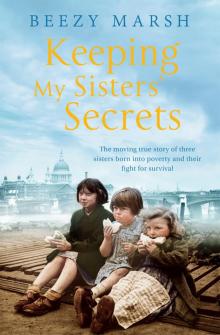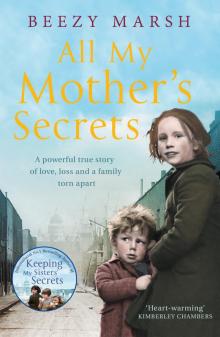- Home
- Beezy Marsh
Keeping My Sister's Secrets Page 20
Keeping My Sister's Secrets Read online
Page 20
‘Please, Maggie, I want us to be a family again, I want you to come home. I promise you I will look after you . . .’ He began to pull something out of his coat pocket.
Peggy gasped as she realized it was money, a whole wad of cash, more money than she had ever seen before in her life.
‘I want to give you this, to show you I will never keep you short ever again and I will never treat you badly.’
‘And where in the name of God have you got that much cash?’ said Mum, her voice rising a semitone. ‘Don’t tell me you have gone and robbed a bank!’
‘No, no,’ he said. ‘I had an old gold fob watch from my captain in the Merchant Navy. I sold it, Maggie, for you.’
He handed her the money and she leafed through it for a moment.
‘All the days and nights I worried about my last farthing and now this,’ she said. Her eyes were blazing with anger. ‘I always said to myself I would wait until Frankie was thirteen before I could leave you and that is what I did, James. I waited and I was scared every day of my life when I was with you. You have no idea how you made me suffer. You could give me all the tea in China and I wouldn’t set foot in the house again. You are thirteen years too late!’
She threw the money back in his face. Then, she turned and walked off the bridge and out of his life.
Peggy’s engagement to George brought some much-needed cheer to the little house in Howley Terrace, which seemed to have a permanent black cloud over it after Mum told Dad it was over, forever.
Of course, Peggy knew about George’s intentions; they had discussed their future together, much as they had discussed politics, in a calm, sensible manner, when they went out courting. But George had a few surprises up his sleeve, and one balmy May evening, as they were crossing Waterloo Bridge, with the city bathed in a red glow of a beautiful sunset, he suddenly dropped to one knee and produced a ring.
Realizing what was happening, a couple of passers-by cheered and clapped. Peggy blushed as he said, ‘Peggy, you are the most beautiful girl in all the world. Would you do me the honour of being my wife?’
‘Oh, George, yes!’ she cried, as he slipped the engagement ring onto the third finger of her left hand. The ring had belonged to George’s granny but was a perfect fit.
‘See,’ he said, as Peggy admired it. ‘It was meant to be. You were always the girl for me, Peggy.’
Peggy couldn’t say her dad was delighted by the news but he did at least crack a smile. She was nearly twenty-one now and he wasn’t about to stop her having the summer wedding she wanted by making her wait until after her birthday in the autumn; he liked George, that much was clear from the way they spent ages discussing politics in the scullery.
‘He’s a fine young man, Peggy. I think you could do a lot worse,’ he said – which was about as close to giving her his blessing as she was ever going to get.
Being engaged to George filled Peggy’s heart with joy and she set about sprucing up the scullery in Howley Terrace, bringing a bunch of flowers home to set on the table once a week and making sure everything on the mantelpiece was nicely dusted. It was as if she was practising to be a homemaker.
They set a date for August and Peggy started to work on the design for her dress. It was the most ambitious thing she had ever made but she was determined to do it and make it the loveliest gown.
Eva had offered to pinch the material for Peggy’s dress but Peggy wanted everything about it to be earned, properly earned. She scrimped and saved and bought the fabric from a shop in the East End and then she did the majority of the sewing herself, using the little Singer sewing machine, with a bit of help from the seamstress up the Cut and a few words of advice from Nanny Day.
Once everyone at the Post Office Savings Bank caught sight of her ring, the news of her engagement spread like wildfire. She had every intention of staying on there as long as she could – right up until the day before her wedding, in fact – because she loved that job and they needed the money to start a home life together. Everyone was really kind to her, especially her boss, Edna, who organized a whip-round. Peggy was given a wedding present of ten shillings a week for every year she had worked, which was very generous, and she immediately deposited it into her savings account. Of course, Peggy knew she couldn’t stay on at work once she was married – those were the rules – but she did feel a tinge of sadness as she left Blythe House for the last time. Looking round at the office for the last time as she pulled on her coat, she thought about how she’d changed. She’d learned so much, not just about doing her job but about people, and she knew she would miss the camaraderie of working there.
Eva and Kathleen slept over at Howley Terrace that night with Peggy to help her get ready.
It seemed strange, all three of them in that little bedroom again. Their lives had moved on so much; they weren’t children any more and Peggy couldn’t help feeling that the best was yet to come, for all of them.
Peggy caught Kathleen admiring her wedding dress, feeling the soft white silk between her fingers. The dress had a V-neck and fluttery sleeves and Peggy had made it to skim her trim little waist, before falling in a small puddle train at her feet.
‘You will be next, Kathleen,’ she said, giving her sister a hug. ‘I hope you don’t mind me beating you to it up the aisle . . .’
She knew their father was sticking to his word, and wouldn’t let her get married until next year.
Kathleen had tears in her eyes as she turned to her sister. ‘I don’t mind, Peg, of course I don’t,’ she said. ‘It’s only right that you get married first. You are my big sister and you make me so proud.’
Suddenly, Kathleen sat down on the bed and started to wring her hands.
‘Besides,’ she went on, ‘I’m worried about having babies, Peg. What if something bad happens, like little Billy from down the road . . .’ Her voice trailed away to nothing and she started to sob, covering her face with her hands.
‘Oh, Kathleen, no. That will never happen to your baby or any of our babies,’ Peggy said, sitting down beside her and hugging her tight. ‘Is that what has been worrying you?’
Kathleen nodded. She looked so young then, Peggy felt as if the years had rolled away and they were twelve and ten again. ‘What happened to Billy was just a dreadful stroke of bad luck.’
‘But I could have done more to help save him. He was ill all that afternoon, you know.’
Peggy held her sister’s hand. ‘Look, even if you had got him to see a doctor a couple of hours sooner, he would still have died. Diphtheria is incurable. It was never your fault. You shouldn’t still be carrying the guilt of it, Kathleen.’
There was a moment’s silence and then Peggy ventured, ‘I was wondering whether everything was all right between you and Albert?’
‘Of course, everything’s fine!’ said Kathleen, stiffening a little. ‘Why shouldn’t it be fine between me and Albert? We are every bit as happy as you and George!’
‘I didn’t mean to upset you,’ said Peggy, stroking her sister’s shoulder. ‘I just meant, if ever there was anything you wanted to talk about, you can trust me. That’s what sisters are for.’
Kathleen looked as if she might have been about to say something, but Eva burst into the room, with a bottle of sherry and three glasses.
‘Come on!’ she said. ‘It’s like a bleeding funeral in here. You’re getting married in the morning. Let’s raise a little glass, shall we?’
Peggy barely slept a wink, she was so excited, and as dawn broke, she heard her dad downstairs, whistling to himself in the scullery, and had to pinch herself to make sure she wasn’t imagining things. She really was going to get married today.
It was the wedding Peggy had always dreamed of. She walked slowly and gracefully up the aisle on Dad’s arm, to find George waiting for her. He was self-assured and handsome, standing there, smiling. Her heart was beating so loudly she could barely get the words out to say her vows and when George slipped his grandmother’s wedding ring on her finge
r, she cried.
Eva and Kathleen were her beautiful bridesmaids, in dresses of matching blue silk, falling just below the knee, with little belts pulled in at the waist and topped with blue pill-box hats. Mum left Patsy at home out of respect for Dad and also so that she wouldn’t raise too many eyebrows in church, in front of the priest, who of course knew they were no longer living together, but said nothing. She sat at one end of the pew and he sat at the other and they barely looked at each other but at least they didn’t fight. They both wanted Peggy to be happy on this, her big day.
Nanny Day sobbed loudly, possibly because Peggy looked so beautiful but more likely because her beloved grandson Frankie couldn’t come to the wedding, having been locked up for breaking into a shop. Peggy didn’t judge Frankie too harshly but it wasn’t a path she wanted to tread. She felt the same way about Eva, who had risen through the ranks of the Forty Thieves.
When Peggy threw her bouquet, she made sure that Kathleen caught it, glimpsing the look of delight on her face as she did.
It wasn’t a fancy affair, in fact it was quite small really, just close family and a few friends and a lovely reception in the back room of the Feathers, with sandwiches and cake for everyone, and a bit of a sing-song afterwards.
Their honeymoon was to be a weekend away in Southend, where she had enjoyed such a wonderful day trip as a child. She couldn’t wait to show George the pier and the amusement park. They weren’t going away for a couple of weeks, though, because George had to work some overtime at the bus depot to pay for it.
Home, for now, was a room in George’s parents in Roupell Street, which Peggy was nervous about but it was just until they had saved up enough to rent a place of their own. They would stay locally; she wanted to be near to her family, particularly because she hoped that she might be lucky enough, soon, to start one of her own. That thought filled her with excitement but she did worry about the world they were going to grow up in. Some people had started talking about the possibility of a war with Germany.
George said that whatever the future brought, they should all get on with their lives, otherwise Hitler and his mob would have defeated everyone through fear, before a shot had even been fired.
‘Whatever comes, Peggy, we will face it together,’ he said, cuddling her close under the bedclothes. ‘With you beside me, I can deal with anything the world cares to throw at me.’
He turned out the light and embraced her. Yes, 1938 was turning out to be more wonderful than she could ever have hoped.
21
Kathleen, April 1939
The imposing white entrance of the Whitehall Theatre seemed to loom over her.
Kathleen fumbled with her dance shoes as she stood on the steps. Was she supposed to go in the front door or around the back somewhere?
Her dance teacher, Miss Fawcett, hadn’t explained that bit and now, with her nerves getting the better of her, Kathleen began to wonder whether the audition was a good idea, after all.
And that was before she got on to Albert’s reaction to her trying out for a job in the chorus line. She’d thought he’d be happy, encouraging maybe, but he was downright angry about it.
‘I don’t want my girl wearing next to nothing, kicking her legs up and flashing her knickers for blokes paying ninepence a go!’ he shouted. ‘You’ll be in one of those girlie shows up at the Windmill next, appearing starkers. I won’t have it’
‘But you know I love dancing, and the Whitehall is a decent theatre. Miss Fawcett only sends girls from her dance academy to good places, Albert,’ said Kathleen. ‘There has got to be more to life than bottling jam!’
He held her face in his hands and looked deep into her eyes. ‘There is more, Kathy, there is more for us, together, when we are married.’
She nodded her agreement and he’d thought that was that. But when Saturday afternoon came around, she made her way to the theatre over the water, driven as if by some unseen force. If she got the job, he’d be happy because it would be the first step up to her becoming famous. Then if she got rich, he’d soon change his tune. All her life, she’d loved performing and this was her big chance, she could feel it, and yet . . . what would Albert say?
As she dithered on the front steps, a door opened and a heavily made-up girl wearing a fur coat emerged. She lit a cigarette and then made her way towards Kathleen.
‘You lost, dearie?’
‘I’m here for the audition,’ Kathleen mumbled, almost apologetically.
‘Well, you’d better get inside then because Mr Baker is waiting and he don’t like to be kept waiting!’ She gesticulated as she spoke and her coat fell open, to reveal a pair of satin shorts which barely covered her modesty, and a sequinned top.
The girl, who couldn’t have been much older than Eva, shouted, ‘Break a leg!’ as Kathleen scampered up the stairs and into the foyer.
She pushed through some heavy doors and into the auditorium, which seemed so modern, all black and silver, compared to the soft, plush, rose and gold of the Trocadero down at the Elephant. The empty hall seemed cavernous, with a balcony extending around the edge upstairs, in a kind of horseshoe shape.
A grand piano stood upon the stage and a pianist, a young, thin bloke with a little pencil moustache was sitting there, picking at his nails.
A voice boomed at her from the stalls, almost making her jump out of her skin. ‘You’re five minutes late! Get a move on! Time is money.’
She scarpered down the aisle and climbed the steps at the side of the stage. A spotlight fell on her, making her squint.
‘What’s your name?’
‘Kathleen,’ she said. Her voice was quavering.
‘Well, Kathleen, take off your coat and let’s have a look at you.’
The owner of the voice, from what she could see, was a short, squat little fella, sitting in the tenth row, in his shirt-sleeves, brandishing a clipboard.
She took off her coat, folded it and placed it at the side of the stage. And then she stood, just as Miss Fawcett had told her to, with her hands lightly clasped in front of her. She smiled, remembering to breathe deeply.
‘Very nice,’ said the man. ‘Now, lift your skirt up a bit.’
‘Pardon?’
‘Show me your legs. I haven’t got all day!’ he commanded.
Kathleen swallowed hard and raised the hem of her skirt an inch or two, until it was just grazing her thighs.
‘Lovely pair of pins you’ve got there!’ he boomed. ‘Now, show me some dance steps. Maisie, can you come and help out?’
A girl dressed identically to the one she had seen on the front steps appeared from the wings and took her place a few paces in front of Kathleen. Glancing over to the side of the stage, Kathleen realized that there was someone else standing there watching her, closely. He was a tall man, with slicked-back dark hair and he carried a ventriloquist’s dummy, dressed identically, in black slacks and a gaudily striped blazer. She could see the ventriloquist’s lips moving as the dummy turned to him and said, ‘Ooh, I fancy her!’ She felt a blush creep up her collarbone and a horrible sick feeling started in the pit of her stomach.
Before she had time to think, the piano struck up a few chords and the girl in front of her started to dance her way across the stage. Step, step, step, shuffle, change, step, shuffle, tap.
It should have been so easy. Kathleen could do better than that with her eyes closed but her legs felt like lead and her heart was hammering in her chest. She started out – step, step, step – but faltered on the shuffle.
‘Try it again. Don’t be nervous, Kathleen,’ came the voice from the stalls.
The ventriloquist leered at her from the wings, running his tongue over his lips, as the dummy opened and closed its mouth.
The piano started up again and the girl performed her steps perfectly, almost gliding across the stage. Kathleen tried again but all she could think of was the bloke staring at her from the wings with his stupid dummy. She heard Albert’s voice, ringing in her ears: ‘You’ll
be in one of those girlie shows up at the Windmill next . . .’ Tears started to well in her eyes. Step, step, step. She tripped over her feet and fell to her knees and started to cry.
‘All right, I’ve seen enough,’ came the voice. ‘Thank you, Kathleen. Next!’
Her head hanging in shame, she gathered her coat and ran the length of the aisle, out of the theatre, leaving her dream of a career in the West End behind her.
In the months following her failed audition, Kathleen did everything she could to be a perfect homemaker at Howley Terrace, seeing as Peggy was no longer there to rule the roost. And her efforts paid off because that June, Dad finally agreed to let Albert marry her. They would have to wait a while longer, until the autumn, he said, but Kathleen was just over the moon to have his permission at last.
As a special treat, Albert was planning to take her for dinner and dancing up West at the Café de Paris, with Nancy and her boyfriend. She had not one, but two, beautiful dresses to wear and Eva had pinched her a pair of perfect little satin shoes to go dancing in.
The legendary band leader Bert Firman was on. Nancy had seen him perform before, and she said it was the best night of her life, with so many posh people done up to the nines, crowding onto the little dance floor. Kathleen just had to get through the next shift at the jam factory and then it was home to get changed before heading out for the evening.
Dad had been really kind to her lately, paying for her to have the wedding dress she really wanted, using some money he had put by after selling an old gold watch. He had hidden that watch for years under the floorboards in the front room and nobody knew about it. That didn’t seem right to Kathleen, after all the times they had struggled for cash, but she was delighted that he had chosen to give it to her to help make her big day as perfect as it could be. She was going down to a special little dress shop in Camberwell Green to have it made up and fitted.
Not one to be bested, Mum had bought her a satin evening gown for dancing, which clung to every curve and had a little bunch of silk flowers on the shoulder. She swished about in it, like a movie star. Her mum was even going to lend her a fur coat tonight, so she wouldn’t get cold, and – more importantly – so she would look every bit as good as those women from Mayfair who didn’t have to work for a living.

 Her Father's Daughter
Her Father's Daughter Queen of Thieves
Queen of Thieves Keeping My Sister's Secrets
Keeping My Sister's Secrets All My Mother's Secrets
All My Mother's Secrets